Muhammad Rizieq Shihab
| Habib Muhammad Rizieq Shihab حبيب محمّد رزق شهاب | |
|---|---|
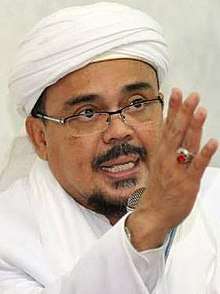 | |
| Native name | محمّد رزق شهاب |
| Born |
August 24, 1965 Jakarta |
| Nationality | Indonesia |
| Other names | Habib Rizieq |
| Alma mater |
King Saud University International Islamic University Malaysia Universiti Sains Islam Malaysia |
| Occupation | Cleric, religious demagogue |
| Known for | FPI |
| Title | Habib |
| Spouse(s) | Fadlun Yahya |
| Children | Rufaidah, Humaira, Zulfa, Muntaz, Fairuz, Zahra |
| Parent(s) |
Hussein Shihab (father) Sidah Alatas (mother) |
| Website | http://www.habibrizieq.com/ |
Muhammad Rizieq Shihab (Arabic: محمّد رزق شهاب, translit. Muḥammad Rizq Šihāb; Arabic pronunciation: [(ʔ)mʊˈħæmmæd rizq ʃihaːb]) also known as Habib Rizieq (born in Jakarta, August 24, 1965)[1][2] is an Indonesian Islamist scholar, demagogue, the founder[3] and leader of the Islamist group Islamic Defenders Front (Arabic: الجبهة الدفاعية الإسلامية; Indonesian: Front Pembela Islam, abbreviated as FPI). He currently resides in Riyadh, Saudi Arabia.
Biography
Early life
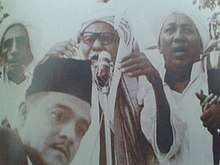
Rizieq was born in Jakarta on August 24, 1965 to Husein bin Shihab and Syarifah Sidah Alatas. Both his parents were Arab Indonesians of mixed Hadhrami and Betawi heritage. His father was Sayyid Husein bin Muhammad bin Husein bin Abdullah bin Husein bin Muhammad bin Shaikh bin Muhammad Shihab,[4] born around 1920, a cofounder of Pandu Arab Indonesia Movement, a boy scouts-like movement for Arab Indonesians[5] founded with his friends in 1937 (which later became PII or Islamic Scouting Organization of Indonesia.[6]) His father died in 1966 when Rizieq was 11 months old, and because of that Rizieq was not put in boarding school. At the age of 4, he continued his education in the Qur'an at mosques. As a single parent, his mother worked as a tailor and bridal makeup artist.
Rizieq is a Sayyid with his clan Shihab (or Shihabuddin Aal bin Syech) lineage tracing back to Imam 'Alī ibn Abī Ṭālib through Imam Ahmad al-Muhajir. Meanwhile, his wife is also of a Sayyid family from Aal bin Yahya.
Education
After graduating from SDN 1 (Public Elementary School No.1) Petamburan, Tanah Abang, Jakarta in 1975, Muhammad Rizieq continued his middle school at SMP 40 (Public Middle School No.40) in Pejompongan, Central Jakarta in 1976. However, the school was too far from his home so he then transferred to a closer school, the Bethel Christian Middle School in Petamburan and graduated in 1979. He continued his high school at SMAN 4 in Gambir, but graduated from the Islamic Village High school in Tangerang in 1982.[7] Furthermore, he took Arabic classes at LIPIA in Jakarta. Considered by neighbors to be a troublesome youth with a penchant for getting into fighting, his family sent Rizieq to Saudi Arabia in 1990 to continue his study at King Saud University, majoring in Usul al-fiqh and Education, which he completed in four years with Cum Laude.[8]
Rizieq took a graduate program at the International Islamic University Malaysia, but only for one year, after which he returned to Indonesia before finishing. This was because his scholarship funding was only adequate for him, not his whole family, to stay in Malaysia.[9] Later, he was able to continue his education and earned an MA degree in Shariah from the same university[10] in 2008 with a thesis titled "Pengaruh Pancasila terhadap Pelaksanaan Syariat Islam di Indonesia'" (The Influence of Pancasila on the Implementation of Islamic Laws in Indonesia).[11]
In 2012 he returned to Malaysia and was admitted to a
doctoral program[12] in Da'wah and Management program at Fakulti Kepemimpinan dan Pengurusan (Faculty of Leadership and Administration) at Universiti Sains Islam Malaysia (USIM), and is currently finishing his dissertation titled "مناهج التميز بين الأصول والفروع عند أهل السنة والجماعة" (The Distinction of Origins and Branches of Ahl Sunnah wa al-Jama'ah) under the supervision of Prof. Dr. Kamaluddin Nurdin Marjuni[13] and Dr. Ahmed Abdul Malek of Nigeria.[14][15]
Personal life
Before fleeing to Saudi Arabia, Rizieq lived in Tanah Abang. To make ends meet, he owned and operated a small store selling perfume and Muslim goods. He is married to Fadlun bin Yahya and has seven children, who are all schooled at Jamiat Kheir.[16]
Rizieq has been in exile in Saudi Arabia since being charged in May 2017.[17]
Activity
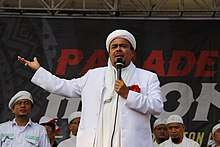
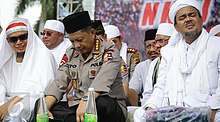
Rizieq worked as a high school teacher for about one year in Saudi Arabia after he finished his undergraduate study, before returning to Indonesia in 1992. In addition to giving religious lectures, Rizieq also at one time served as the Principal of Madrasah Aliyah at Jamiat Kheir until 1996. When he was no longer the head of the school, he still actively taught at the school as the teacher of Fiqh or Usul al-Fiqh.[16]
His organizational experience began when he became a member of Jamiat Kheir. He once served as a member of the Chamber of Shariah at BPRS At-Taqwa, Tangerang. Before becoming the head of the FPI, he was chairman for a number of Majelis Ta'lim (places where religious lectures take place) around the suburbs of Jakarta.[16]
Rizieq declared the establishment of the Islamic Defenders Front (FPI) on 17 August 1998. The FPI became well known from the Ketapang incident, which occurred in Jakarta on 22 November 1998. Around 200 members of the FPI engaged in riot and affray in a confrontation with opponents. This religious, inter-race and inter-group clash resulted in a number of residential houses and houses of worship being burned and a number of people killed.[7]
Rizieq was jailed for seven months in 2003 for inciting his young, white-shirted followers, who often would hide their faces bandit-style behind handkerchiefs, to attack nightspots in Jakarta with clubs and stones.[18] On October 5, 2008 Rizieq was again put in prison for one and half years due to the violent attack against the Aliansi Kebangsaan untuk Kebebasan Beragama dan Berkayakinan (AKKBB)[19] which was holding a demonstration in Monas on June 5, 2008. 59 FPI members were arrested and 12 members of the AKKBB were injured.[20]
Rizieq was the head of the FPI from 1998 to 2003, and since 2003 he has become the Chairman of the board of the Executive Tanfidz. He was elected as the Great Imam of FPI for life in 2013.[21]
Views
As declared on his FPI website, his stands, with FPI, regarding ISIS are:[22][23][24]
- The FPI remains steadfast in struggling to apply Shariah laws in the Homeland through within the guidelines of Shari'ah and the Constitution.
- The FPI remains a faithful supporter of the Islamic Jihad Movement around the world, in the fight against all forms of unjust global hegemony (New Imperialism) that stand against the establishment of the World Islamic Caliphate as referred in the Manhaj Nubuwwah (The Prophet's Way).
- The FPI strongly renounces all forms of warfare and sectarian violence in the name of Jihad among Muslims arising from differences in mazhab (school of thoughts) which are not fundamental issues in Islamic Theology (ʿAqīdah).
- The FPI calls the whole Islamic Jihad movements to unite and work together in carrying out Shariah-based jihad without killing or mutilating civilians who are not involved in the war, whatever their Mazhab or religion is.
- The FPI supports the appeal and advice of the al-Qaeda Leader Ayman al-Zawahiri that all Jihad components of Al-Qaeda, either Muhammad al-Jawlani's forces in Syria and troops of Abu Bakr al-Baghdadi in Iraq, as well as other Jihad components of Al-Qaeda, to unite and in brotherhood with all other brothers of the Islamic Mujahideen around the world, to continue the Jihad in Syria, Iraq, Palestine and other oppressed Muslim countries.
"People should not generalize that all Shia are heretical, nor none are led astray. Even Shia followers acknowledge that internally there are various Shiite groups, and some of them are led astray, namely the ones who deify Ali, believing the Angel Gabriel miscommunicated the message, or believing the Koran is supposed to be thicker than it is now. These are recognized by mainstream Shiites as misguided groups. In fact, these were the ones meant by the MUI fatwa earlier about Shia. There is something needs to be well recognized by Shiites that Ahlu Sunnah has a firm stance about Sahabah. For Sunnis, anyone who berate and moreover to say the Sahabah are unbelievers would be considered as a person being led astray. This is the key (towards reconciliation between Sunnis and Shiites)."
— Muhammad Rizieq Shihab, Habib Rizieq Shihab refuting Ustadz Yazid Jawas
In response to a controversial book with the title "Mulia dengan Manhaj Salaf" ("Being Noble with Manhaj Salaf") written by Yazid bin Abdul Qadir Jawas and published by the Pustaka At Taqwa, he says:[26][27]
I am concerned about the presence of this book. If we open the chapter thirteenth which is the last chapter, here the author mentions several firqahs (sects) considered as misguided (considered as infidels) and misleading, such as the list item number eight mentions Asharites, the list item number nine includes Maturidiyyah. The number fourteen or thirteen includes sufism, number fourteen includes Tablighis, number fifteen includes Muslim Brotherhood, number seventeen includes Hizbut Tahrir, and the list item number twenty-seventh includes Jaringan Islam Liberal (JIL).
So Ash'ari and Maturidi, which representing Ahlus Sunnah wal Jamaah, are included in the group along with the misguided JIL which in fact is misleading. Even with the ease he said that Tablighi and the Muslim Brotherhood also go astray. Is this not the sort of divisive race?
If the author wants to disseminate his own respective ideologies, that is up to him. If he believes his Aqidah is the correct Aqidah, that is his business. If he feels his opinion is the most correct opinion, that is also his own business. But if he claims other Muslims groups are infidels, he has no right.
Such book divides people. If the author feels his Wahhabism doctrine is the most correct one and he is the pure, that is his right. He calls himself a follower of Salafi or in Indonesia known as the term Wahhabi. If he thinks he is the most holy, it is his right. If he thinks he is the most straight, that is also his right. But he has no right to call other fellow Muslim groups as gone astray, pagans or infidels.
Moreover, the adherent Muslims of the Ash'ari and Maturidi have been around for over 1000 years as the representatives of Ahlus Sunnah wal Jama'ah, while the Wahhabism is just born yesterday (recently), but yet continuously wants to call Ash'arites as infidels. Indeed, during this more than 1000 years who have been actually called as the (truly) Ahlus Sunnah? For 1000 years Ash'ari and Maturidi have been the ones called Ahlus Sunnah. Wahhabism is not in the list. It has just emerged recently, but yet it wants to judge other Muslim sects who do not agree with it as misguided Muslims.
He also thinks Indonesia, Malaysia and Brunei, as states with the large majority of the population are of Ash'ari must also have a law forbidding the spread of Wahhabism.[28] He has been also accused by Wahhabi-affiliated news media as a Shiite, because he does not want to say that all Shiah are led astray, although he also says that Shiah spread should be limited or even forbidden.[29]
Legal issues
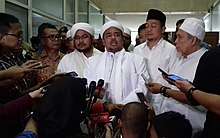
- In 2003, Rizieq was sentenced for seven months of prison on the charge of disturbing public order due to allegedly ordering the FPI to ransack and destroy several Jakartan entertainment venues. He served his sentence in Salemba Penitentiary.[30]
- In 2008, Rizieq was imprisoned for one and a half years after being convicted of assaulting members of the National Alliance for Freedom of Religion and Faith (Aliansi Kebangsaan untuk Kebebasan Beragama dan Berkeyakinan) during their convention at National Monument square.[30]
- In January 2017, the Indonesian Police Bureau declared Rizieq a suspect in a case of slander against Pancasila, the Indonesian state ideology.
- In January 2017, the FPI called for the withdrawal of Rupiah banknotes, accusing the Bank of Indonesia of hiding the Communist hammer-and-sickle in rupiah bills.[31] The allegation, however, was categorically rejected, and exposed as being a rectoverso security feature featuring the Bank's logo. The FPI has been accused of stirring public unrest, slandering the Bank and the Government, and insulting the rupiah, the national currency being a state symbol and protected under law.[32]
- In May 2017, Rizieq was named in a criminal case involving sexually explicit messages he exchanged with Firza Hussein. The charges were brought against him under the 2006 Anti-Pornography Act, a law he helped pass.[33][34] On the 29th, he was charged and summoned to appear as a suspect, subsequently fleeing Indonesia for Saudi Arabia on the pretext of performing the Hajj.[35][36]
Publications
Awards and Honors
On March 19, 2009, Habib Rizieq was crowned by Sultan Sulu Ismael Kiram II[41] as the Grand Mufti of the Sultanate of Sulu with title Datu Paduka Maulana Syar'i Sulu (DPMSS).[42]
References
Footnotes
- ↑ "KOMPAS - Profil Singkat FPI dan Habib Rizieq" (in Indonesian). Retrieved December 26, 2013.
- ↑ Tholkhah, Imam; Yusuf, Choirul Fuad (2005-01-01). Contemporary Islamic Movements of Reformation Era. Departemen Agama, Badan Litbang Agama dan Diklat Keagamaan. ISBN 9789793370002.
- ↑ Fuller Collins, Elizabeth (2007). Indonesia Betrayed: How Development Fails. University of Hawaii Press. ISBN 978-0-8248-3183-7.
- ↑ "Biografi Ringkas Al Habib M. Rizieq bin Husein Syihab" (in Indonesian). Retrieved December 20, 2016.
- ↑ Teik, K.; V. Hadiz; Y. Nakanishi (eds.). Between Dissent and Power: The Transformation of Islamic Politics in the Middle East and Asia. Springer. ISBN 978-1-137-40880-8.
- ↑ Prasidi Jamil, Budi. "Biografi Habib Rizieq Syihab".
- 1 2 "Biografi Habib Rizieq Shihab" (in Indonesian). Retrieved August 20, 2014.
- ↑ Fealy, Greg; White, Sally, eds. (2008). Expressing Islam: Religious Life and Politics in Indonesia. Institute of Southeast Asian Studies. ISBN 978-981-230-851-1.
- ↑ Tholkhah, Imam; Fuad Yusuf, Choirul (2005). Contemporary Islamic Movements of Reformation Era. Departemen Agama, Badan Litbang Agama dan Diklat Keagamaan. ISBN 978-979-3370-00-2. Retrieved August 21, 2014.
- ↑ Masyithoh, Siti (2011). "Metode Dakwah Habib Rizieq bin Husein Syihab pada Majlis Ta'lim al-Ishlah Jakarta Pusat" (PDF) (thesis). Universitas Syarif Hidayatullah. Retrieved August 21, 2014.
- ↑ "Habib Rizieq: Si Goen ingin "Menggurui" Saya dan Abu Bakar Ba'asyir tentang Iman". Arrahmah (in Indonesian). July 4, 2008. Retrieved August 21, 2014.
- ↑ "Profil Habib Rizieq" (in Indonesian). Retrieved August 21, 2014.
- ↑ "Profil Profesor Madya Dr. Kamaluddin Nurdin Marjuni". Retrieved Nov 9, 2014.
- ↑ Fadillah, Ramadhian (11 May 2017). "Habib Rizieq sedang di Malaysia, selesaikan kuliah Doktor" (in Indonesian). Retrieved 15 May 2017.
- ↑ "Rizieq Shihab Becomes Doctoral Candidate at University of Islamic Science Malaysia". Netralnews. 11 May 2017. Retrieved 15 May 2017.
- 1 2 3 "Biografi Habib Rizieq Shihab" (in Indonesian). Retrieved Aug 20, 2014.
- ↑ http://www.abc.net.au/news/2018-06-18/police-drop-pornography-charges-hardline-indonesian-cleric/9882386
- ↑ Bond, Christopher S.; Simons, Lewis M. (2009). The Next Front: Southeast Asia and the Road to Global Peace with Islam. John Wiley & Sons. ISBN 978-0-470-73007-2.
- ↑ kittysuryo (2008-06-14), Video Rekaman Penyerbuan Massa FPI ke AKKBB, retrieved 2016-12-20
- ↑ Chernov Hwang, Julie (2012). Peaceful Islamist Mobilization in the Muslim World: What Went Right. Palgrave Macmillan. ISBN 978-1-137-01623-2.
- ↑ "Gelar Imam Besar hingga Capres 2014 untuk Habib Rizieq". Merdeka. August 24, 2013. Retrieved August 21, 2014.
- ↑ "Maklumat FPI Tentang ISIS". August 10, 2014. Retrieved September 6, 2014.
- ↑ "Sikap FPI Soal Issue ISIS; FPI Dukung Pendirian Khilafah & Harapkan Persatuan Mujahidin" (in Indonesian). Retrieved November 24, 2015.
- ↑ "SIKAP FPI TERHADAP ISIS,DAULAH ISLAMIYAH" (in Indonesian). Retrieved November 25, 2015.
- ↑ "Tanggapan Habib Muhammad Rizieq Shihab Terhadap Wahhabi dan Syiah". December 17, 2012. Retrieved September 6, 2014.
- 1 2 Bantahan Habib Rizieq Shihab Terhadap Ustadz Yazid Jawas Part 1 (video) (in Indonesian). Retrieved September 6, 2014.
- 1 2 Bantahan Habib Rizieq Shihab Terhadap Ustadz Yazid Jawas Part 2 (video) (in Indonesian). Retrieved September 6, 2014.
- ↑ "Habib Rizieq Syihab Larang Wahabi di Indonesia". Islam Times (in Indonesian). December 12, 2013. Retrieved September 10, 2014.
- ↑ "Habib Rizieq Shihab Usulkan Dibuatnya Undang-Undang Pelarangan Penyebaran Ajaran Syiah dan Wahabi". Muslim Media News (in Indonesian). December 14, 2013. Retrieved September 10, 2014.
- 1 2 M Andika Putra; Raja Eben Lumbanrau (17 January 2017). "Jejak FPI dan Status 'Napi' Rizieq Shihab". CNN Indonesia (in Indonesian).
- ↑ Safrin La Batu (January 23, 2017). "FPI leader calls for withdrawal of banknotes with 'communist symbol'". The Jakarta Post. Jakarta.
- ↑ Safrin La Batu (January 23, 2017). "FPI leader questioned for allegedly insulting rupiah". The Jakarta Post. Jakarta.
- ↑ "Jakarta Metro Police to Summon Rizieq Shihab after Returning from Pilgrimage". 2 May 2017.
- ↑ http://www.abc.net.au/news/2017-05-30/indonesian-cleric-denies-pornography-claims/8573684
- ↑ "Polisi Tetapkan Habib Rizieq jadi Tersangka Kasus Pornografi". Detik News (in Indonesian). Retrieved 2 June 2017.
- ↑ "Rizieq Shihab named suspect in pornography case while abroad". The Jakarta Post. 29 May 2017. Retrieved 6 June 2017.
- ↑ bin Husein Shihab, al-Habib Muhammad Rizieq (2011). Hancurkan Liberalisme, Tegakkan Syariat Islam. Jakarta: Suara Islam Press. ISBN 9786029985702.
- ↑ "Habib Rizieq Hadirkan Buku Wawasan Kebangsaan Menuju NKRI Bersyariah". www.suara-islam.com. Retrieved 2017-06-29.
- ↑ Metode Dakwah Habib Rizieq bin Husein Syihab pada Majlis Ta'lim al-Ishlah Jakarta Pusat, p. 36.
- ↑ Metode Dakwah Habib Rizieq bin Husein Syihab pada Majlis Ta'lim al-Ishlah Jakarta Pusat, p. 32.
- ↑ KabarNet (2013-04-07). "Habib Rizieq Ternyata Mufti Besar Kesultanan Sulu". KabarNet (in Indonesian). Retrieved 1 April 2018.
- ↑ Suara Islam (2013-04-06). "Filipina di Balik Konflik Sulu-Sabah". www.suara-islam.com (in Indonesian). Retrieved 1 April 2018.
Bibliography
- Fuller Collins, Elizabeth (2007). Indonesia Betrayed: How Development Fails. University of Hawaii Press. ISBN 978-0-8248-3183-7.
- Masyitoh, Siti (2011). Metode Dakwah Habib Rizieq bin Husein Syihab pada Majlis Ta'lim al-Ishlah Jakarta Pusat (PDF) (S.Sos.I.). Jakarta: Universitas Islam Negeri Syarif Hidayatullah.
- Jahroni, Jajang (12 March 2008). Defending the Majesty of Islam: Indonesia's Front Pembela Islam, 1998-2003. Chiang Mai, Thailand: Silkworm Books. ISBN 9789749511114.
- Rosadi, Andi (2008). Hitam-putih FPI: Mengungkap Rahasia-rahasia Mencengangkan Ormas Keagamaan Paling Kontroversial. Jakarta: Nun Publisher. ISBN 9789791611022.
External links
| Wikimedia Commons has media related to Muhammad Rizieq Shihab. |